I ran across this article on the Falkland war, I have blogged before about the Falkland war, and I knew that France had supplied many weapons to the Argentinians, including the Exocet that had a lethal reputation that was proven during the resulting Falkland war. Even back then when I was a sophomore in High School during the Falkland War, I had a wishy washy image of the French and wondered if they were helping the Argentinians because the French have a history with the British and it wasn't sunshine and rainbows. After reading this article it kinda confirmed the initial impressions. I also had the same opinion because the French supplied the Iraqi's. I wondered if they played both sides against the middle because it would help France if the United States was lessened by a bloody battle/war in the Persian Gulf against Saddam Hussain. Yes I know that the French had the Foreign legion here to help and they did exceedingly well from what I know. But the French had sacrificed the legion before in Vietnam and the surrounding areas due to the Indochina War and Algeria due to politics.
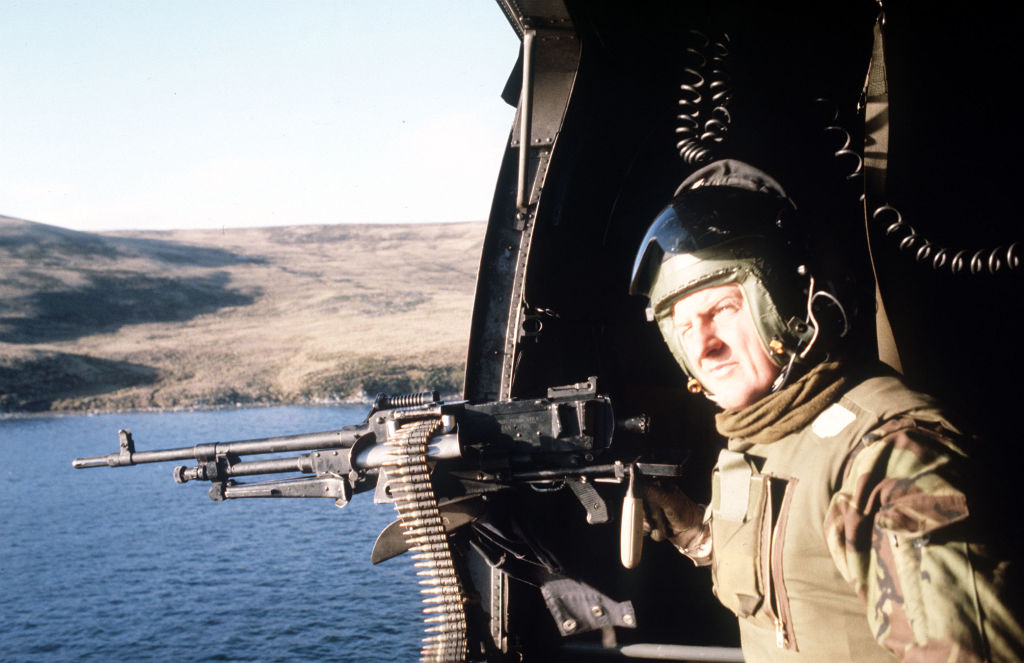
During the war, the British received support from France but formerly secret documents show that the French may have been working both sides of the conflict.
In May of that year, the Argentine forces used Exocet missiles during an airstrike that killed 32 people. The missiles were fired at the British ships HMS Sheffield and Atlantic Conveyor.
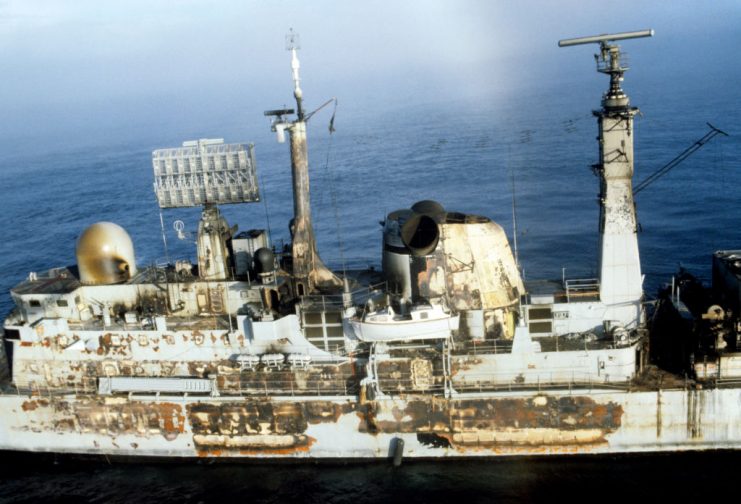
When the war began, France embargoed weapons sales and support for Argentina. They also allowed the British to use French ports in West Africa and provided them with information on the weapons and planes that they had sold to Argentina.
French President Francois Mitterrand made the decision to aid the British. While the UK’s Secretary of State for Defence Sir John Nott praised France as being the UK’s “greatest ally,” members of the French government were not pleased with their president’s decision.
The French ambassador to London, Emmanuel de Margerie, wrote a scathing description of Margaret Thatcher as “Victorian, imperialist, and obstinate” with a “tendency to get carried away by combative instincts.”
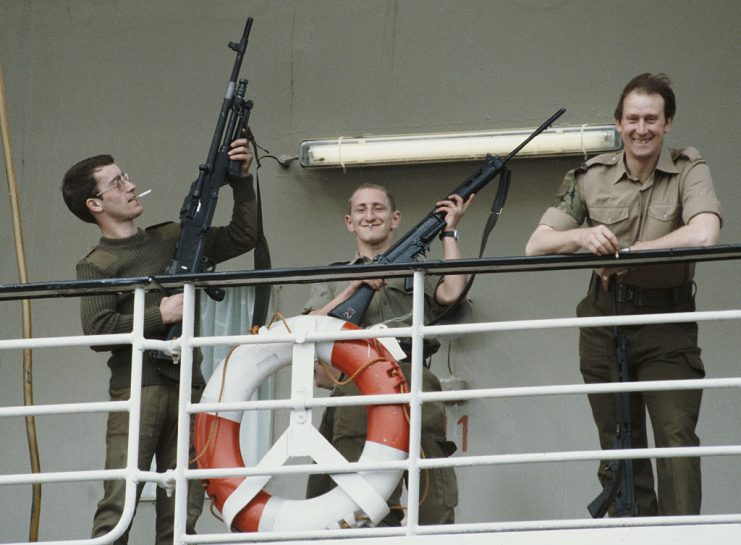 A
group of British soldiers show of their rifles as they stand on the
deck of the RMS Queen Elizabeth 2 (QE2) before the ship departs for the
Falklands, from Southampton docks on Wednesday, May 12, 1982. The QE2
took part in the Falklands War during 1982, carrying troops and
volunteer crew to the South Atlantic conflict, with her decks converted
into three helicopter landing pads.French official Bernard Dorin decried Britain’s “superpower
arrogance” and their “profound contempt for Latinos.” He made these
claims in a document titled, “The Falklands: Lessons from a Fiasco.”
A
group of British soldiers show of their rifles as they stand on the
deck of the RMS Queen Elizabeth 2 (QE2) before the ship departs for the
Falklands, from Southampton docks on Wednesday, May 12, 1982. The QE2
took part in the Falklands War during 1982, carrying troops and
volunteer crew to the South Atlantic conflict, with her decks converted
into three helicopter landing pads.French official Bernard Dorin decried Britain’s “superpower
arrogance” and their “profound contempt for Latinos.” He made these
claims in a document titled, “The Falklands: Lessons from a Fiasco.”A BBC investigation has uncovered evidence that, even though the embargo was in place, a team from France worked with the Argentine troops in the Falklands during the war. The team allegedly tested the missile systems to ensure they would fire.
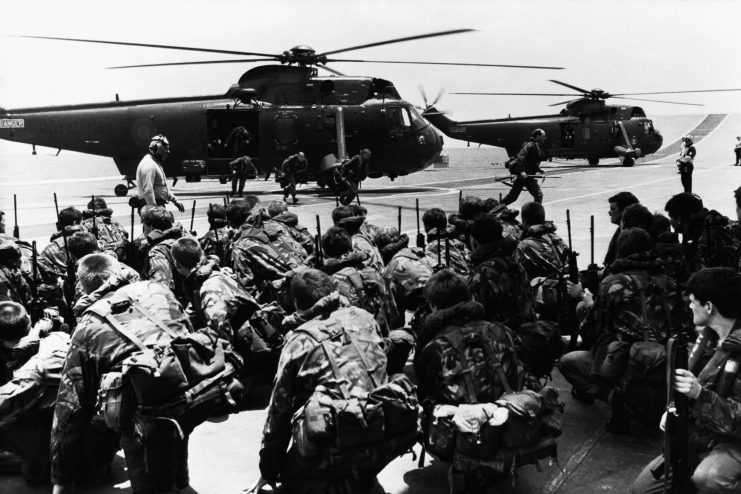
Three of the missiles failed and the team repaired the issue which allowed the missiles to be used against British troops.
During the war, 659 Argentinian and 253 British troops were killed.
The Falklands War began when Argentinian troops invaded the Falkland Islands on April 2, 1982. The Falklands are a British territory located in the southwest Atlantic Ocean off the coast of Argentina.
Argentina has long claimed rights to the islands, which they call Malvinas. Argentina inherited the islands from the Spanish crown in the early 1800s.
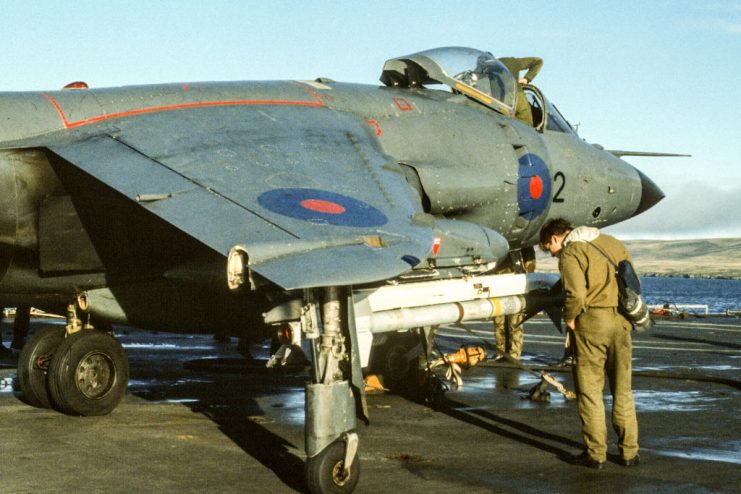
Argentina did not believe that the UK would respond with force if they invaded the islands. But, despite being 8,000 miles away, British Prime Minister Margaret sent a force of warships and hastily refitted merchant ships to reclaim the British territory.
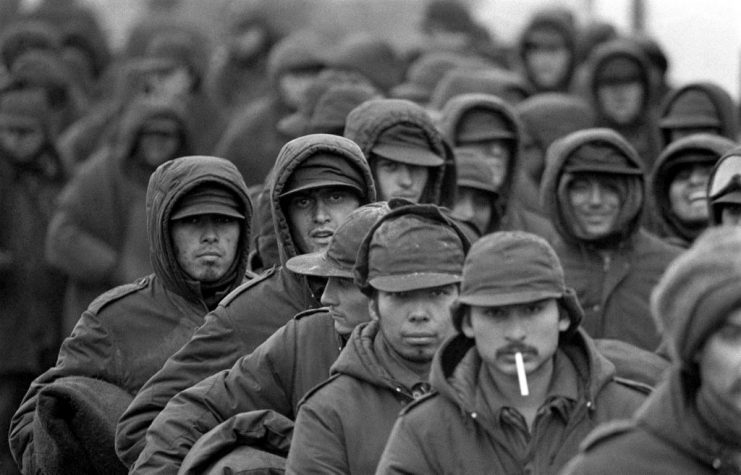
But the Argentine air force was still a threat to the British. Their aircraft sank several British warships, including the HMS Sheffield with an Exocet Missile, whom the Frigate's Friend or Foe system wasn't updated to classify the Exocet as "Foe"
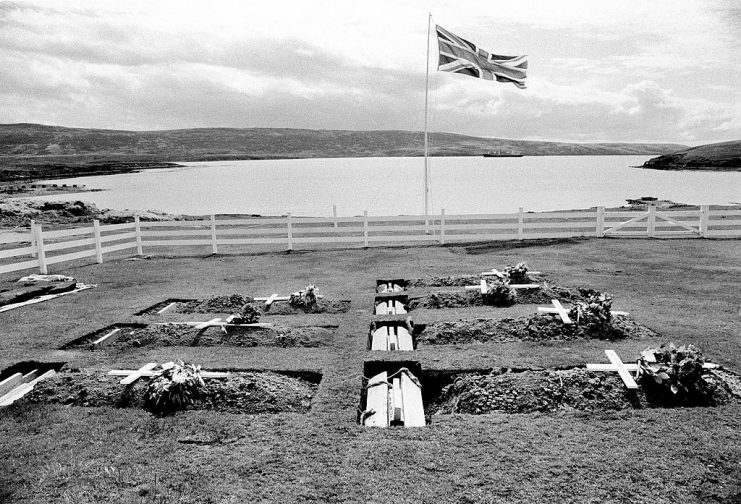
On June 11, 1982, the battle for the capital, Stanley, was underway and the Argentinians surrendered on June 14, 1982
The Americans also played their part by supplying the then-new Stinger missile for use by our Special Air Service. One was used to shoot down an Argentinian Pucara ground attack aircraft, the first use of the Stinger in combat.
ReplyDeleteHey Bad Frog;
DeleteI didn't know that. The relationship of the United States and Great Britain was very special especially back then.
It didn't help that Sheffield still had the Exocet in their system as a 'friendly' missile... Sigh
ReplyDeleteHey Old NFO;
DeleteI remembered you telling me that in a prior post. I should have added it to this one. Thanks for jarring my memory.
Pull up a sandbag beneath the swinging hurricane lamp, and I’ll spin you a dit …
ReplyDeleteAs a serving Bootneck, I was part of 45 Cdo RM (Four-Five Commando. Royal Marines) during the same 'conflict.'
Having fought through and cleared the Argie positions on Two Sisters Ridge; the Unit shook themselves out, and formed up before moving forward to a reverse slope on Sapper hill, allowing full observation of the town of Stanley in the far distance. All the while, as a battle group, waiting to receive orders for the assault on Stanley itself.
Low and behold, several hours later, Gawd spoke! (Or at least his direct representative on the Falkland Islands did - in the form of Major General J. J. Moore RM.) An order generated by HQ 3 Cdo Bde stated a ceasefire of sorts was in place; the Argies had agreed to surrender.
Not long after a flurry of consequential orders were issued, one of which was along the lines of; 'An Argie C-130 will shortly be taking off from Stanley Airport, do not shoot at the aircraft under any circumstances, it will have a Harrier escort, etc, etc...’ I have to admit, a slow lumbering C-130 climbing for altitude would have made an easy target even for small arms fire, it was subsequently joined by two slow stalling Harriers in flight - a sight to behold.
En-route to dear old Blighty courtesy of SS Canberra:
I was reliably informed by a ‘bunting tosser’ (HQ & Sigs, marine signaller), that the C-130 was indeed carrying a precious cargo of interest - French Exocet engineers who had assisted in setting up land based Exocet missile systems for the Junta. Barstewards! Had it been known there were ‘exceptionnel frogs’ within the C-130 at the time, I wondered if the ‘weapons tight’ order would have been observed …
Shortly after the event the leaked story hit the British media, which in turn saw a rapid decline in sales of French wine, cheeses, apples, and Gaelic produce in general throughout the United Kingdom. No love lost between us since the first Anglo War of 1109 - through to 31st January 2020 – Brexit!
Thank Gawd for the English Channel …
Yours Aye
Ex Bootneck
Hey Bootneck;
DeleteDang, what a yarn,mind boggling actually. I wonder what politics were applied to allow the French to leave unscathed especially since their work did such damage to the British fleet. I remembered something about that coming out in the mid 80's. The British soldiers that I did interact with from the BAOR had a mixed review on the French, Stalwart allies were not words used with the French.
Is that sandbag still comfortable mate?
ReplyDeletePrior to, during, and after the conflict;
British Aerospace and the French company Aerospatiele shared airtight binding contracts relating to military hardware, software, and space hardware. Such contracts were worth £/€ Billions through international sales.
After a declaration of war was issued to Argentina, the French government was secretly asked to mercenary loan (for many shekels) Aerospatiele civil and military tech engineers to the Argies based on the Falkland Islands, from where they would establish land based Exocet systems. It was to prove a deeply embarrassing decision for French politicians and their military chiefs, they were caught with their bloomers around their ankles when we landed at the settlement of San Carlos for a spot of tea and tiffin.
The French President and his military tacticians miscalculated Maggie Thatcher’s resolve, as well as the capability of an outnumbered British Task Force travelling 8000 miles to lock horns at the start of a subpolar Falklands winter. Her Majesties Armed Forces were up for such an adventure! Fortunately for those of us who fought during the Falklands war, the Argentinean Junta also favoured buying French built Entendard and Super Etendard strike fighter aircraft, as opposed to the Harrier (thank Gawd). To this day, I have the greatest respect for the Argie pilots, whose courage and discipline can never be questioned.
Very Many Thanks to the 40th President of the United States, Ronald Wilson Reagan (bless his cotton socks.) And a hearty thanks to every American who believed in the British action that took place. The link below explains all …
Incidentally;
Besides military walking wounded, the same C-130 carried additional passengers of a nature considered to be highly embarrassing to ‘friendly’ foreign governments of the day. The historical archive of which, has been sealed for seventy years.
On paper, the French continue to be our ‘stalwart allies.’ But, I would ask you to peruse the www, and seek information on the U.K. USA Agreement known as ‘Five Eyes’ (FVEY).
U.S., U.K., Australia, New Zealand, and Canada.
No mention of an ‘F’ in Country!
https://www.dailymail.co.uk/news/article-7992175/CIA-secretly-OWNED-encrypted-code-making-machines-decades-allowing-spy-governments.html
Yours Aye
Ex Bootneck
Could I please take the opportunity to give a thumbs up to Old NFO, it's been a long while since the days of 'The Mellow Jihadi' blog ...
Hey Ex-Bootneck,
DeleteI will pass on the thumbsup to Old NFO. You can say Hi to him at his blog www.oldnfo.org He is a class act, but we don't tell him that. We just give him crap about being this side of Methuselah And I remember the classifications excluding NOFORN stuff, there were what I called the "Inner Circle" US,UK,AUS,NZ,CAN. The intel was shared amongst just "us",
Ex-Boot! Glad to see you're still looking down at the daisies my friend! And yes, I do miss your blog and your irreverent commentary! Hopefully all is well with you.
Delete